Registration of Medicine in the UAE: A Comprehensive Guide
Registration of Medicine in the UAE: A Comprehensive Guide
The United Arab Emirates (UAE) is a rapidly growing market for pharmaceuticals and healthcare services, attracting global attention from manufacturers and distributors alike. However, before any medicinal product can be legally sold or marketed in the UAE, it must be registered with the country’s health authority — primarily the Ministry of Health and Prevention (MOHAP). This blog post provides a step-by-step guide to the medicine registration process in the UAE.
Why Register Medicine in the UAE?
Registering medicine is a mandatory legal requirement in the UAE to:
-
Ensure the safety, efficacy, and quality of medicines
-
Prevent counterfeit and substandard products
-
Protect public health
-
Facilitate smooth customs clearance for imports
Regulatory Authorities Involved
-
Ministry of Health and Prevention (MOHAP) – Responsible for licensing and regulating pharmaceuticals.
-
Dubai Health Authority (DHA) and Department of Health – Abu Dhabi (DOH) – Have additional local regulations for hospitals and pharmacies.
-
Emirates Health Services (EHS) – Involved in public health and drug monitoring.
Types of Medicines That Require Registration
-
Prescription drugs
-
Over-the-counter (OTC) medicines
-
Herbal and natural products
-
Homeopathic products
-
Vaccines and biologicals
Requirements for Registration
To register a medicine with MOHAP, companies must submit the following:
-
Legal documents: Valid trade license, distribution agreement, registration certificate of the manufacturer, Good Manufacturing Practice (GMP) certificate
-
Technical documents: Product dossier in CTD (Common Technical Document) format, certificate of pharmaceutical product (CPP), clinical trial data (if applicable)
-
Samples and lab analysis reports
-
Labeling and packaging details
Steps in the Registration Process
-
Local Agent Appointment
Foreign pharmaceutical companies must appoint a local UAE-based agent or distributor. -
Online Application via MOHAP Portal
Registration applications must be submitted through the MOHAP’s online system. -
Document Review & Product Evaluation
Authorities will review the product dossier, verify compliance with UAE standards, and may request additional information. -
Laboratory Testing
Samples may be tested in certified UAE labs to ensure quality and safety. -
Final Approval and Listing
Once approved, the product will be listed in MOHAP’s database and given a registration number.
Timeline and Costs
-
Processing time: Usually between 3 to 9 months, depending on the product category and completeness of the submission.
-
Fees: Vary depending on the type of medicine and testing requirements. It is advisable to consult the latest MOHAP fee schedule.
Important Tips for a Smooth Registration
-
Ensure the manufacturing company holds GMP certification.
-
Prepare all documents in English or Arabic.
-
Maintain up-to-date and well-organized product dossiers.
-
Work with an experienced local agent who understands UAE regulations.
Conclusion
Medicine registration in the UAE is a structured and essential process to ensure the health and safety of residents. By understanding the requirements and working closely with MOHAP and other local authorities, pharmaceutical companies can successfully enter the UAE market and contribute to the country’s growing healthcare sector.
If you're planning to register your product in the UAE, it's wise to partner with a regulatory consultant or agent familiar with local procedures to avoid unnecessary delays.




تعليقات
إرسال تعليق